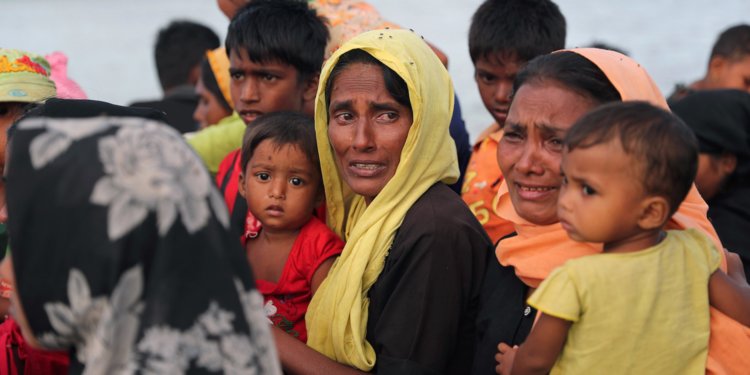
by admin | May 25, 2021 | Muslim World, World

Myanmar : Rohingya remaining in Myanmar’s Rakhine state face a “serious risk of genocide”, UN investigators have said, warning that the repatriation of a million others already driven from the country by the army remains “impossible”.
In a damning report released on Monday, a United Nations fact-finding mission also called for top Myanmar generals, most notably army chief Min Aung Hlaing, to face trial for the killings, gang rape and arson during the Rohingya crackdown.
The mission, set up by the UN’s Human Rights Council in March 2017, doubled down on its findings published last year, in which it had labelled the 2017 crackdown as a “genocide”.
Some 600,000 Rohingya are living in “deplorable” conditions in Rakhine state, subject to restrictions on movement that touch almost every aspect of their lives, the report said.
The factors that “contributed to the killings, rapes and gang rapes, torture, forced displacement and other grave human rights violations” by the Myanmar military and other government authorities are still present, it said.
“Myanmar continues to harbour genocidal intent and the Rohingya remain under serious risk of genocide,” the investigators said in their report, due to be presented to the UN Human Rights Council in Geneva on Tuesday.
Myanmar had repeatedly denied the UN investigators’ 2018 findings and is yet to respond to the latest report.
About 740,00 Rohingya fled from Rakhine to Bangladesh following a crackdown by the government forces and other groups that began in August 2017.
The fleeing Rohingya, who alleged rape, murder and torture, joined about 300,000 Rohingya living in southern Bangladesh, which now hosts the largest refugee camp in the world.
While the predominantly Muslim Rohingya have lived in Myanmar for decades, the government views them as “illegal immigrants”. A 1982 law denied citizenship to them, effectively rendering them stateless.
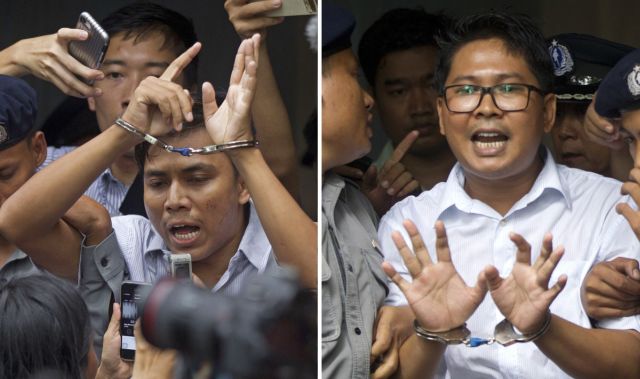
by admin | May 25, 2021 | World
 Yangon : Two Reuters journalists sentenced to seven years in prison for violating Myanmar’s Official Secrets Act while investigating the killing of Rohingya in the country lodged an appeal on Monday.
Yangon : Two Reuters journalists sentenced to seven years in prison for violating Myanmar’s Official Secrets Act while investigating the killing of Rohingya in the country lodged an appeal on Monday.
Than Zaw Aung, a defence lawyer representing the two Myanmar journalists Wa Lone, 32, and Kyaw Soe Oo, 28, told Efe news that he filed the appeal at the Yangon’s High Court.
According to the lawyer, the journalists have a chance of being released by the court, although he did not rule out going to the Supreme Court if the verdict issued on September 3 is maintained.
The president and editor-in-chief of Reuters, Stephen J. Adler, said in a statement that “in condemning them as spies, it ignored compelling evidence of a police set-up, serious due process violations, and the prosecution’s failure to prove any of the key elements of the crime”,
Adler also urged Myanmar “to uphold its stated dedication to rule of law, freedom of the press, and democracy by ordering the release of our colleagues”,
Wa Lone and Kyaw Soe Oo were arrested on the night of December 12, 2017, in possession of confidential documents which, according to them, had just been handed over by two police officers whom they had met.
The reporters were investigating a massacre of the Rohingya minority in the village of Inn Dinn in Rakhine state.
Authorities accused them both, under the colonial-era Official Secrets Act, of having obtained secret documents about the military operation in Rakhine, which the Burmese army had launched following the series of attacks by an insurgent Rohingya group against border posts on August 25, 2017.
Around 725,000 Rohingya fled to Bangladesh following the violent military offensive in which UN investigators found elements of genocide, crimes against humanity and war crimes.
—IANS
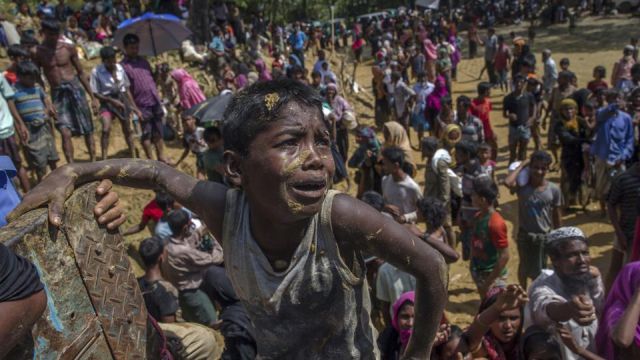
by admin | May 25, 2021 | Muslim World
 Dhaka : The UN World Food Programme (WFP) on Wednesday said that it needs more funds to continue assisting the hundreds of thousands Rohingya refugees, who have been living in Bangladesh camps after fleeing an offensive by the Myanmar military last year.
Dhaka : The UN World Food Programme (WFP) on Wednesday said that it needs more funds to continue assisting the hundreds of thousands Rohingya refugees, who have been living in Bangladesh camps after fleeing an offensive by the Myanmar military last year.
The WFP said it had spent around $20 million to assist the refugees in Bangladesh following the crackdown in Myanmar in August 2017.
“We are here to highlight the plight of families of Rohingyas so that governments around the world do not forget about their needs. The international community stepped up in a successful way… but pretty soon we will need more money,” said WFP Executive Director David Beasley in a press conference.
Beasley said the shortage of funds was owing to the fact that “in the last two years the number of civilian hungry people in the word rose from 80 million to 224 million, primarily driven by man-made conflict whether we talk about Syria, Iraq, Yemen, South Sudan, Nigeria or North East Nigeria”, Efe news reported.
The WFP usually imports emergency supplies from outside the country but in the case of Bangladesh, the agency has been trying to integrate into the local economy, said Beasley, adding that the WFP has been buying around $10 million worth of products monthly from Bangladesh.
Beasley also said that the situation had improved in the refugee camps since his visit last year.
Meanwhile, on Tuesday, Bangladesh announced that it will begin to repatriate the Rohingyas to Myanmar around the middle of November. The announcement came nearly a year after both the countries signed a repatriation agreement in November 2017.
The Rohingya exodus had began after the Myanmar military launched the August offensive in Rakhine state following attacks on multiple government posts by Rohingya rebels.
The offensive was globally condemned for its rights abuses including loot, torture, rapes and torching of entire Rohingya villages. The UN called it “ethnic cleansing”.
—IANS
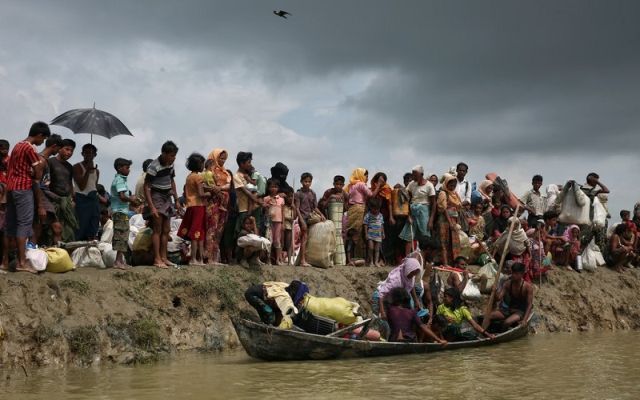
by admin | May 25, 2021 | World
 By Arul Louis,
By Arul Louis,
United Nations : After China and Russia failed to block a briefing on Myanmar, the Security Council heard the head of an independent investigation into alleged atrocities against the Rohingya calling for prosecuting senior leaders of national forces on charges of genocide.
The Chair of the Independent International Fact-Finding Mission on Myanmar set up by the Human Rights Council, Marzuki Darusman, said that they had found evidence of war crimes and crimes against humanity and asked the Council to refer the matter to the International Criminal Court or create an international criminal tribunal to prosecute those responsible.
Before he was allowed to speak, China and Russia objected to the briefing saying it would only complicate matters and make a resolution of the Rohingya crisis difficult.
Russian’s Permanent representative Vassily Nebenzia dismissed the report as “raw” and unreliable and pointed out that the US, which was now backing the mission, had withdrawn from the Human Rights Council questioning its objectivity.
In the procedural vote, where permanent members do not have veto powers, the Council decided with nine votes in favour, three abstentions and three – China, Russia and Bolivia – against to to hold the briefing.
The vote was an illustration of the discord at the Security Council that hobbles it effectiveness in dealing with many crises.
Backing the call for prosecutions, US Permanent representative Nikki Haley said: “Only accountability for the crimes against Rohingya will serve the cause of peace in Burma. This is not about finger pointing. It is about accepting the realities of what happened so that healing and accountability can occur.”
Bangladesh Permanent Representative Masud Bin Momen backed the fact-finding mission’s report and said that Council should act on it.
He offered his country’s assistance for international prosecution of those responsible for the crimes against the Rohigya.
Myanmar’s Permanent Representative Hau Do Suan said that his country’s security forces carried out legitimate counter-terrorist actions and these were done without “genocidal intent”.
The Rohingya crisis was precipated by attacks by Arakan Rohingya Salvation Army terrorist group against 30 police outposts and a military installation, and hundreds of innocent civilians, including Hindus, other ethnic minorities and Muslims supporting the government were massacred by the group.
The Myanmar government has established an independent commission of inquiry to go into allegations of human rights violations and had already taken action some of the military, police and national security officers.
China’s Permanent Representative Ma Zhaoxu came out in support of Myanmar saying that it was making progress in resolving the Rohingya issue by trying to implement agreements regarding their return and allowing UN agencies access.
At the same time, he praised Bangladesh for hosting the refugees and said Beijing was helping it and Myanmar deal with the crisis.
In meeting facilitated by his country, Ma said Myanmar had agreed to a timetable for the return of refugees.
(Arul Louis can be reached at arul.l@ians.in and followed on Twitter @arulouis)
—IANS
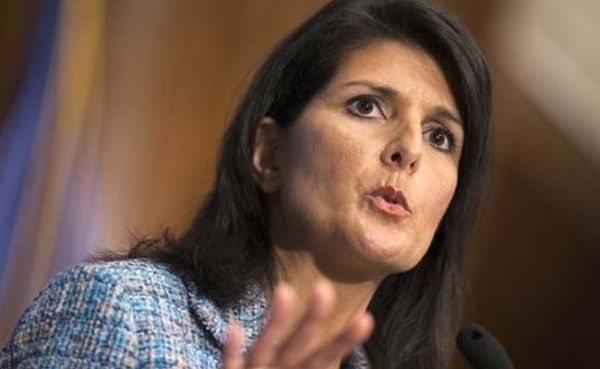
by admin | May 25, 2021 | World

Nikki Haley
By Umar Farooq,
Washington: The U.S. on Monday announced giving over $185 million in additional aid to Rohingya relief efforts in Myanmar and Bangladesh.
The announcement was made by U.S. Ambassador to the UN Nikki Haley, at a meeting attended by Turkish Foreign Minister Mevlut Cavusoglu.
In a statement, Haley said the bulk of the aid would go towards helping Rohingya refugee communities in Bangladesh to support emergency services such as food, water, sanitation, health care and psychosocial support.
“Still more needs to be done, so we need other countries to do their part as well,” she said in the statement.
“This additional funding brings U.S. humanitarian assistance in response to the Rakhine State crisis to nearly $389 million since the outbreak of violence in August 2017,” read the statement.
Rohingya Persecution
Since Aug. 25, 2017, nearly 24,000 Rohingya Muslims have been killed by Myanmar’s state forces, according to a report by the Ontario International Development Agency (OIDA).
More than 34,000 Rohingya were also thrown into fires, while over 114,000 others were beaten, said the OIDA report, entitled Forced Migration of Rohingya: The Untold Experience.
According to Amnesty International, more than 750,000 Rohingya refugees, mostly children and women, have fled Myanmar and crossed into Bangladesh after Myanmar forces launched a crackdown on the minority Muslim community.
The Rohingya, described by the UN as the world’s most persecuted people, have faced heightened fears of attack since dozens were killed in communal violence in 2012.
The UN has documented mass gang rapes, killings — including of infants and young children — brutal beatings, and disappearances committed by Myanmar state forces. In a report, UN investigators said such violations may have constituted crimes against humanity.
—AA





